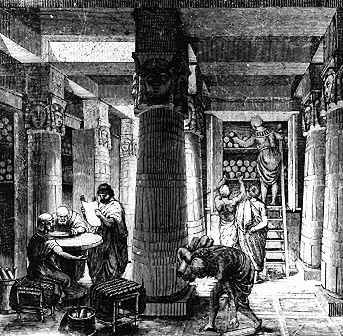2.1 Did Paco find out about the first library in the world?
Paco is not a native speaker. So, he doesn't use a lot of phrasal verbs. However, from context he can almost always understand native speakers who are used to phrasal verbs, since they are frequently used in spoken English.
Now, it's time to learn some of the most common phrasal and prepositional verbs in English. To begin with, watch the following video and take notes of the phrasal verbs that appear in it. .
|
|
Watch the video again and answer the following questions. Take note of the phrasal verbs which appear in it and begin learning common phrasal verbs.
1. Why do a lot of people have negative feelings about phrasal verbs?
2. Do people who speak English as a foreign language use many phrasal verbs?
Click on the picture below to learn some more things about phrasal verbs and start getting longer lists of these idiomatic verbs in English.
 |
| Imagen: Creación Propia |
On the web you will be able to find lots of lists, and even specific dictionaries of phrasal verbs. There is a really good one on this website.
Listen to the song 'Another Day in Paradise', by Phil Collins, and complete the blanks with the particle needed to complete the lyrics.
|
She calls
to the man on the street
'Sir, can
you help me?
It's cold and
I've nowhere to sleep,
Is there
somewhere you can tell me?'
He walks
,
doesn't look
He pretends he
can't hear her.
Starts to
whistle as he crosses the street
Seems
embarrassed to be there.
Oh think twice,
it's another day for
You and me in
paradise.
Oh think twice,
it's just another day for you, |
She calls
to the man on the street
He can see she's been crying. She's got blisters on the soles of her feet Can't walk but she's trying. Oh think twice... Oh lord, is there nothing more anybody can do? Oh lord, there must be something you can say. You can tell from the lines on her face You can see that she's been there. Probably been moved from every place Cuz she didn't fit there. Oh think twice... |
 |
| By Domitori. Public domain |
The Royal Library of Alexandria, or Ancient Library of Alexandria, in Alexandria, Egypt, was probably the largest, and certainly the most famous, of the libraries of the ancient world. It flourished under the patronage of the Ptolemaic dynasty, and functioned as a major center of scholarship, at least until the time of Rome's conquest of Egypt, and probably for many centuries thereafter. Alexander, although picking the site and planning the general layout of the city, died before he could take part in the construction of the library or academy that was created in his name.
A Note on Terminology: The Greek term bibliotheke (βιβλιοθήκη), used by many historians of the era, refers to the [royal] "Collection of Books", not to any building, nor to the social networks which sustained and operated the collection, which complicates tracking the history and chronology of its destruction.
Generally thought to have been founded at the beginning of the third century BC, the library was conceived and opened either during the reign of Ptolemy I Soter or during the reign of his son Ptolemy II. Plutarch (AD 46–120) wrote that during his visit to Alexandria in 48 BC, Julius Caesar might have accidentally burned the library when he set fire to his own ships to frustrate Achillas' attempt to limit his ability to communicate by sea. According to Plutarch's account, this fire spread to the docks and then to the library.
However, this version of events is not confirmed in contemporary accounts of Caesar's visit. In fact, it has been reasonably established that segments of its collection were partially destroyed on several occasions before and after the first century BC. A modern conflation (no older than the late eighteenth century) attributes the destruction to Coptic Christian Archbishop Theophilus of Alexandria in 391, who called for the destruction of the Serapeum -- the Daughter library and a temple to the God Serapis.